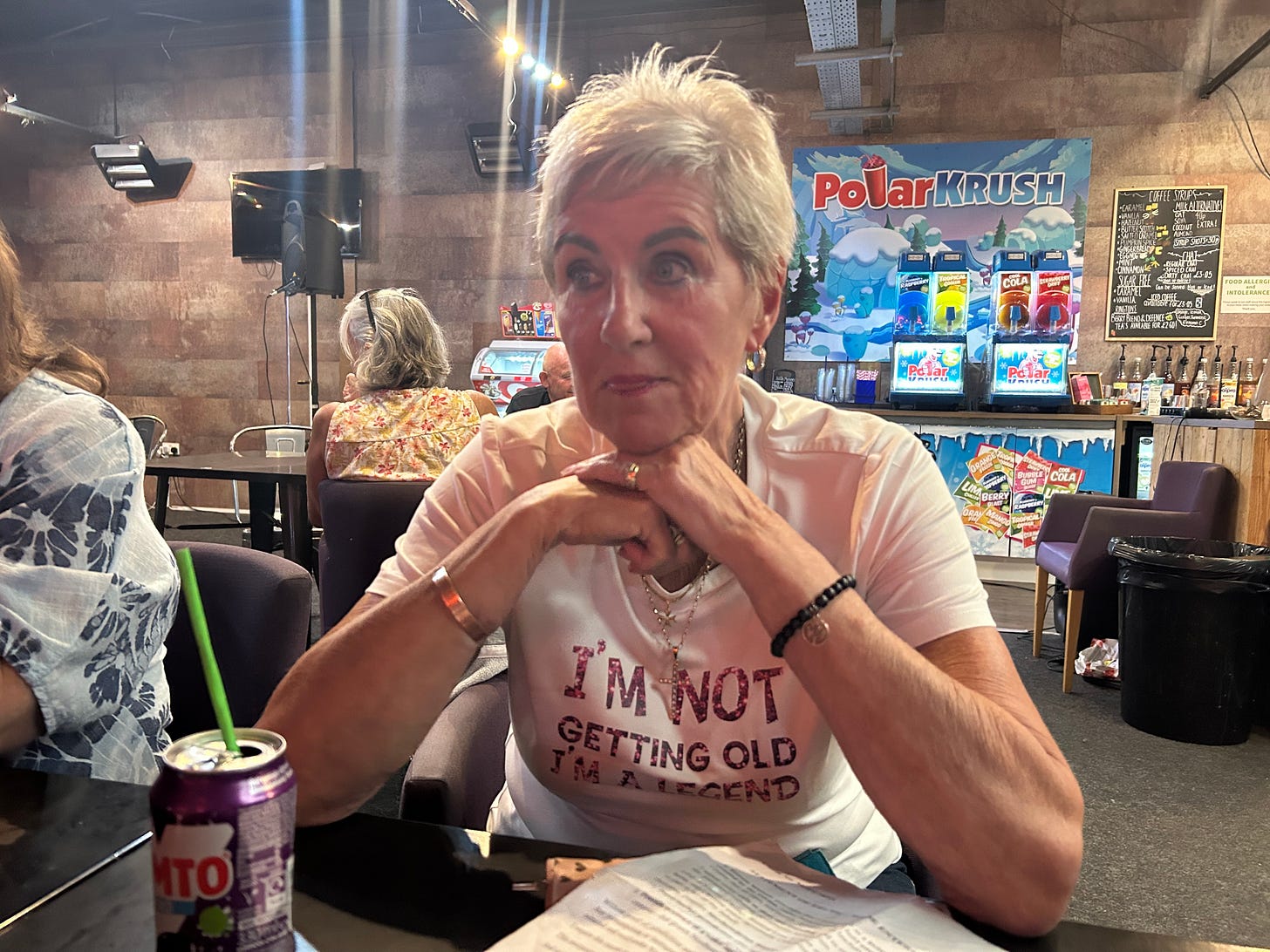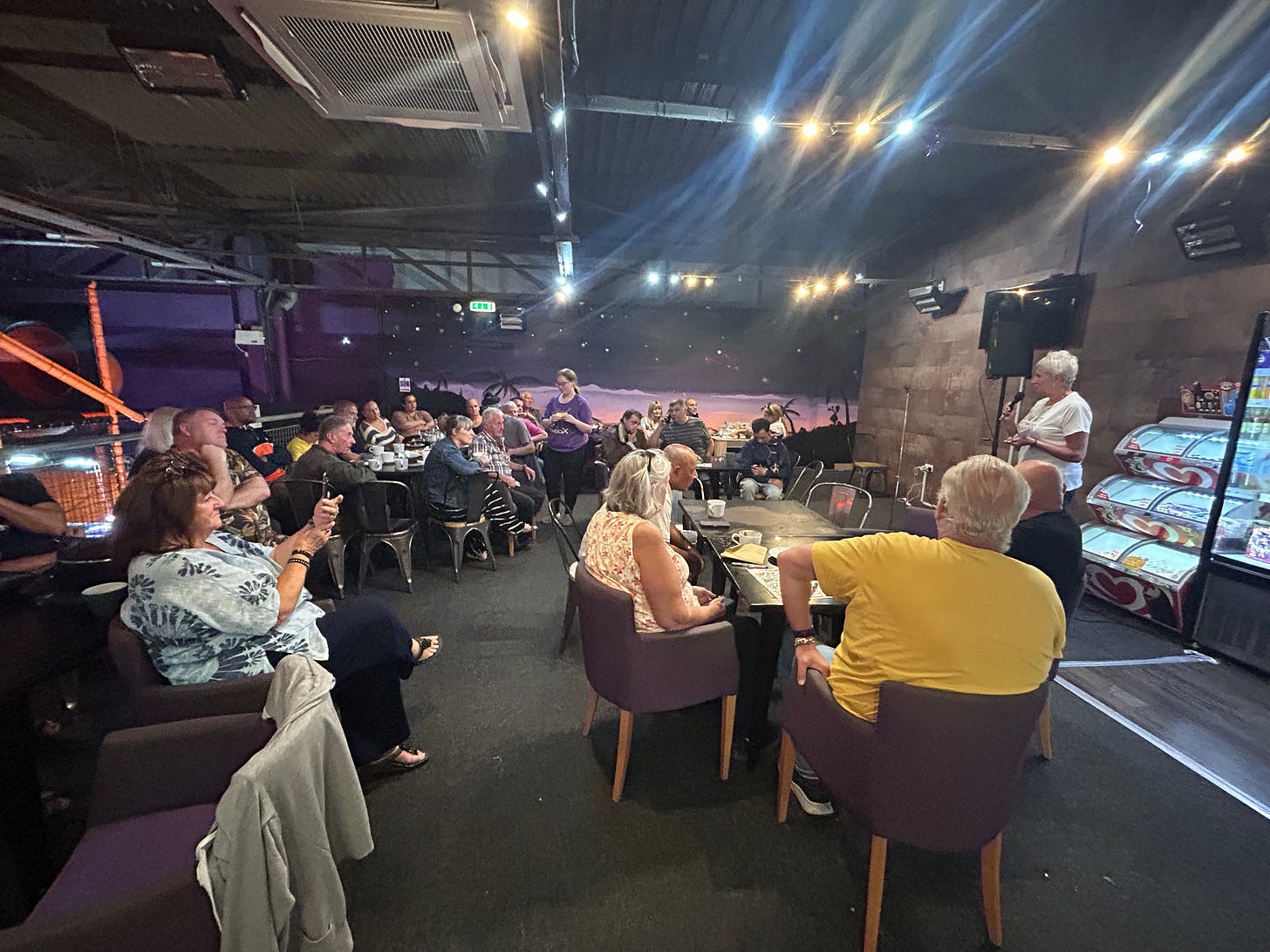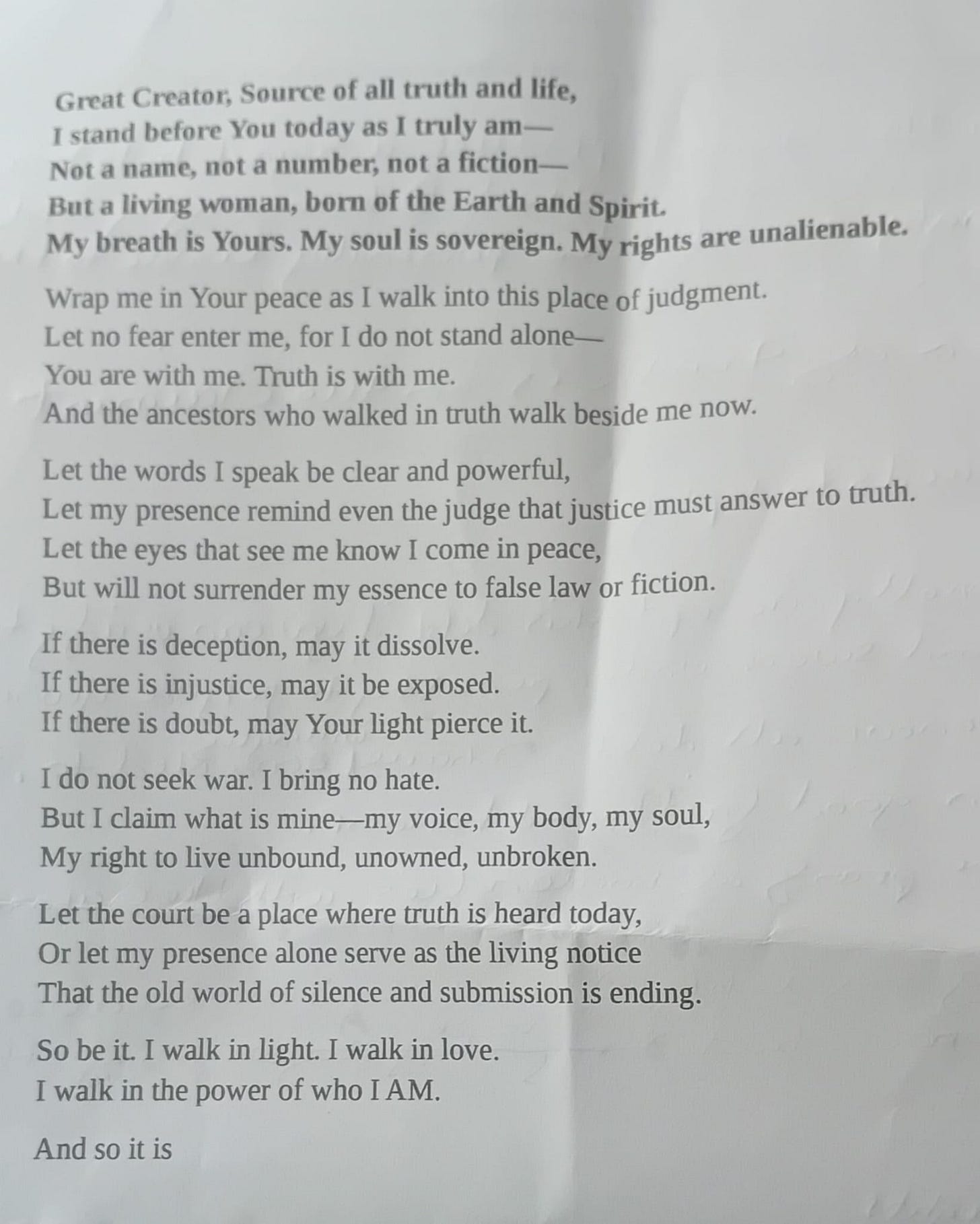The judge who hugged a living woman
There are many good people trapped in a bad justice system and see its faults
Meet my heroic friend, Yvonne.
Yvonne is a living woman. Oh, yes, she is!
A judge hugged Yvonne because she stood her ground and refused to relinquish her status.
Let me tell you the story of an extraordinary recent court hearing in Newcastle.
Two months ago I attended another hearing at the same court building where Yvonne was the defendant, but on a different matter. Yvonne and myself are part of a group of freedom-loving people in the North East who meet up every Thursday evening at a children’s indoor play centre after hours. The group formed as part of the resistance against the Covid lockdowns, and people share their stories of resisting tyranny and corruption. When there is a court case, many will come along as supporters. Some came to my hearing in Carlisle in June. Three dozen turned up to Yvonne’s crucial council tax hearing on the previous occasion. You can read the story here.
This time, she turned up at court, and her name wasn’t on the listing board, but the tannoy was calling out for her. After the previous occasion, where the courtroom was genuinely bursting with people at the absolute limit of health and safety, they wanted to know how many observers she was bringing this time. Now, being public hearings, anyone can come — I didn’t know I would overwhelm the court’s capacity in Peterlee in October 2023 when I put the word out 48 hours before the hearing.
Anyhow, in this instance, nine turned up, which is a good number. There is clearly a recognition in the court system that the public is taking a principled interest in lawful due process. It is a quiet but unmistakable shift — a reminder to those in authority that every procedural step is now part of a living record, witnessed, remembered, and shared beyond the walls of the courthouse.
Rather than council tax, this was about water utility payments, where Yvonne is pushing back against lack of consent and state overreach. The details of the case are almost immaterial. What matters is that she not only differentiated herself, Yvonne the living woman, from the legal fiction of Mrs Watson, but that the court embraced this openly. In simple terms: the ‘legal fiction’ is the paper entity the state uses for contracts and charges; the ‘living woman’ is the person of flesh and blood.
Oh, the times are a changing!
This is what Yvonne said, and as context she has a stammer, so had registered this disability with the court. The judge offered to read out her statement for her, but she declined, opening with:
For the record, I have a speech impediment, and it helps me to speak a little more clearly when I stand. Therefore, I will remain standing as living woman to address the court. I mean no disrespect at all.
I have seen both honourable and appalling conduct from judges, but the same is true of campaigners and activists, many of whom are unnecessarily antagonistic to authority. I believe this respect is important, as judges by the nature of the job are forced into the energy field of other people’s misconduct, and it is an uncomfortable task. While the law is a buffer, turning sin into symbols, they are human and feel what is going on.
Having established she was going to speak her piece, even if awkwardly, Yvonne delivered her message:
STATEMENT OF TRUTH - TO BE ENTERED INTO RECORD
I, Yvonne Watson, proclaim that I stand here as a living woman of flesh and blood, created by the Divine, under Natural Law. I hold unalienable rights granted by the Creator that no man, institution, or court can lawfully remove or override.
I appear today only to state my standing and to establish the truth. I do not submit to any presumed corporate or statutory jurisdiction.
I live in honour: I follow Natural Law, I cause no harm, loss, or injury to any living being, and I honour every agreement I knowingly make. No other being is authorised to sign or act on my behalf.
Therefore, I require Northumbrian Water and this court to:
1. Prove lawful jurisdiction over me, a divine living woman.
2. Provide evidence of a valid bilateral agreement—lawfully entered into by me with full consent-that grants Northumbrian Water any lawful claim.
Without proof of jurisdiction and a valid agreement, there is no lawful claim.
Any presumptions or instruments attempting to bind me without my consent are rebutted and void under Natural Law.
I require this matter to be dismissed unless such proof is produced.
This testimony is true, given in peace and honour. I stand by it fully.
And so it is.
Yvonne Watson - Living Woman
6th August 2025
In this moment, the court was presented with a standard it could neither ignore nor cheapen: a living soul, demanding proof, under the gaze of a public that now understands the difference between authority earned and authority presumed.
The deeper point being, our birth certificates act like company incorporation documents, and allow us to interface with the legal fictions of the state. There are pros and cons to this arrangement: it has utility, subject to not being fraudulently imposed or secretly collateralised. When an entity like Northumbrian Water invoices the legal fiction, and there is nothing to bind Yvonne the woman to Mrs Yvonne Watson, then she (the woman) is not liable for the debt. Now, if I sign a contract then my autograph does tie the man or woman to the fiction. But these “obligations by default” — similarly to council tax — fail to exhibit voluntary agreement with a true obligation.
That is extortion, and is morally wrong. And the presumption of jurisdiction, without proof, underpins much of modern “industrial pseudo-justice”. It is also the rot at the root of too much modern casework — process without consent, enforcement without foundation, and judgments that quietly depend on the silence of those who know better.
Here is where it gets interesting. Many judges immediately dismiss such matters as “freeman of the land” or “sovereign citizen”. Yet there is a subtlety in what Yvonne said. She did not claim to be under traditional common law, still a construct of man. She simply stated she operates via natural law, a divinely ordained coherent order — the Logos incarnated. This is the highest jurisdiction, and her birthright to occupy it. That Northumbrian Water wish to diminish her divine status, converting it to a legal fiction, used to be a crime, so I hear — “personage”. Some judges, whether through “out of hours” research of innate spiritual guidance, grasp there is a difference between the woman of flesh and the paper fiction.
The judge accepted Yvonne’s statement as being truth, and on the record. She also recognised Yvonne was asserting her status as some personal hardship. While Yvonne technically did not win the case, and costs were awarded against the fiction, they cannot be collected, as Yvonne herself has declined to form joinder with that fiction in this situation. She is not a “paper slave”, but a sovereign being. When the hearing was over, the judge, clearly moved by her personal courage, came down from her podium and gave Yvonne a hug, and invited Northumbrian Water into a conversation about what had happened — which they declined. It isn’t like they can complain about judicial bias, as the judgement notionally went their way.
Yvonne had brought a prayer with her, which she handed to the judge. And there’s a final twist to the story. She asked this judge to pass a copy on to the judge from the previous hearing, which she agreed to do. This is the third time I have had a good experience in Newcastle at court. Something huge is happening. It is like there is a spreading cultural knowledge that things are “off”, and many people want to “make it right”.
Even the ushers and security staff, seeing people from this same group over and over, treat us with dignity. Dignity, once extended, is hard to withdraw — and those who persist in denying it to the living will one day have to account for the harm done in its absence. We are all collectively escaping from an abusive doctrine that the living can be treated as dead fictions, stripping away consent, mercy, and conscience. Our mission is to liberate everyone from constructs that deny our essence — including judges.
Now, for my own confession. I may have “softened the ground” a little for Yvonne, in that I had written to the first judge after the hearing in June. This second spiritually alive judge in August may have expected me personally to be in the public gallery — and would not have known if I was or wasn’t, or how widely events would be reported. As it happens I wasn’t there, but she didn’t know that.
I wasn’t going to publish this letter, as it is part of my personal advocacy for reform. However, it is part of this evolving “good news” story. I wonder if this (along with my prior article) have “done the rounds” behind the scenes. That you, dear readers, are known to be the “extended virtual public gallery” for court hearings far away is having an effect. We are collectively “vibing the darkness away”.
Here is what I put in the post, printed on my best paper. This private note is part appreciation, and part quiet nudge toward reform. The system cannot survive the public pushing back like this indefinitely; every act of principled resistance to procedural fraud makes its contradictions more visible, and its authority less defensible. Ultimately we want judges who uphold the whole law, and do nothing else!
Dear Judge [REDACTED],
I was one of the attendees in the overflowing public gallery at the hearing on 17th June 2025. My purpose in writing is not to raise a complaint or initiate an appeal — quite the opposite. It is to acknowledge your conduct and extend my appreciation for your commitment to open justice under challenging circumstances.
I write as a campaigner for procedural integrity in the justice system, with a substantial public readership across the UK and the United States. The attached article — distributed to my 23,000 newsletter subscribers — reflects positively on your handling of the hearing. That you welcomed an unusually large public attendance and maintained composure in a difficult case speaks well of your professional character and personal conscience.
The situation you found yourself in was not of your own making. Judges quite properly seek to uphold stare decisis as a foundation of judicial continuity. Yet we appear to be entering unfamiliar territory — where, in some domains, legal simulation under colour of law is displacing genuine adjudication. Council tax liability orders processed through automation are one example. I am currently engaged in challenging another: the Single Justice Procedure and its reliance on what I term “ghost courts,” lacking statutory foundation under the Courts Act 2003.
There is growing tension between administrative efficiency and constitutional integrity. Judges like yourself are increasingly confronted with novel dilemmas for which precedent offers little guidance. Are automated traffic penalties, electricity meter disconnection warrants, and clean air zone fines truly creatures of law, or are they the output of unexamined systems that bypass proper judicial scrutiny?
More and more of us are now questioning things we once took for granted: that summonses are lawfully issued, that courts are duly constituted, that enforcement follows adjudication. This questioning is not born of rebellion, but of necessity. Many are being forced, in quiet ways, to choose the spiritual kingdom they serve — whether of truth or expediency, conscience or convenience. I do not offer this as a judgement on anyone else’s path, least of all yours. Rather, I share it to normalise what was, by any measure, an extraordinary hearing. Whether or not the liability order was “real” in the legal sense is now only part of the question. The deeper matter is whether it was true.
The moment on 17th June, when you welcomed three dozen citizens into your courtroom — at some personal discomfort — stood in contrast to other hearings I have witnessed, where transparency was resisted or discouraged. By your actions, you indicated that truth matters to you. For that, I wish to express sincere thanks.
I hope you find the attached article of interest and read it in the spirit in which it was written: not as criticism, but as observation. It documents a significant day from the perspective of one member of the public and stands as a small tribute to the power and importance of judicial openness.
Yours sincerely,
Martin Geddes
There seems to be a bifurcation. In Carlisle, I claim that the bench and court officials are committing crimes against me, as they are knowingly operating without jurisdiction. The suppression of my lawful s.111 appeal compounds this concern — creating reasonable grounds to suspect coordinated actions that have the effect of depriving rights, misrepresenting the law, and enabling official misconduct. If such conduct stands unchallenged, it will not merely stain Carlisle’s name, but corrode the credibility of every institution that condones or ignores it.
Yet in other parts of the legal system, the judiciary is becoming conscious that they are operating under fraudulent jurisdiction, and want to put things right. It does not take many to stand up and assert their status; if it became a daily occurrence in courts, then the normalisation of legal fictions as binding on living men and women without consent would collapse. The demolition will not be orderly. Those who persist in upholding fraudulent jurisdictions will find themselves answering not only to history, but to the law they once presumed to serve.
Awareness is spreading, and positive change is happening. Our campaigning work over many years is paying off. The machinery of pseudo-justice cannot withstand daily doses of truth spoken in public; it depends on acquiescence and the slow corrosion of conscience. Every time someone refuses to yield their living status, another rivet pops loose. Each day they delay in correcting this invites further exposure, and the longer they hide from it, the higher the political and reputational cost will be when the reckoning arrives.
You just have to stand as the living.
And speak as the living, even if you stutter or stumble.
Then hug the living judge when they see you for who you are — and let every court know that it is they who now stand in judgement.
🙏





Easily one of the most uplifting pieces you have penned Martin and thank you for so eloquently giving a voice to the change that is occurring in OUR courts…
Well this report is a pleasant change from the usual Martin and is wonderful to hear.